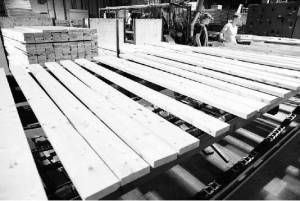Exemption in Softwood Lumber Deal in Question for Province
 Article by Adam Huras, Telegraph Journal
Article by Adam Huras, Telegraph Journal
photo credit: Telegraph Journal
The regional group that secured an important exemption for the Atlantic provinces from quotas imposed as part of the last softwood lumber deal with the United States isn’t representing New Brunswick this time around.
The Maritime Lumber Bureau won’t explain why it’s no longer negotiating for the provinces, a role it has routinely held since its inception in 1938.
But the change in approach is raising questions about whether New Brunswick can secure the same deal for the province’s forestry industry in a looming round of high-stakes talks.
Premier Brian Gallant told the Telegraph-Journal that the provincial government is doing everything in its power to maintain the status quo.
“We’re going to do what we can, the premiers in the Maritimes, to represent the interests of the forestry sector,” he said.
“I have spoken to the other premiers about this issue. I’ve spoken to (Canada’s Ambassador to the United States) Gary Doer, (U.S. Ambassador) Bruce Heyman, and other officials and diplomats about this issue, making it very clear that this is top of mind to our province.”
He added: “I’m very convinced that we’ll all play our part ensuring we communicate loud and clear that the softwood lumber agreement is important to our economy and the exemption is something that we want to see continue.”
The 2006 agreement – originally reached to regulate Canadian softwood exports to the U.S., ending what was five years of court battles – expired earlier this month.
It returned $4 billion in duties collected by the U.S. on Canadian producers, and gave the Atlantic provinces an exemption from quotas imposed on larger producers such as British Columbia.
New Brunswick is second only to British Columbia in the importance of its forestry sector’s contribution to the provincial GDP. Lumber exports in the province have increased 40 per cent over the past four years to $397 million.
It was the Maritime Lumber Bureau that negotiated the exemption for the region in 2006. And that regional partnership appeared to have aided New Brunswick.
Nova Scotia’s amount of wood coming from Crown land was smaller than New Brunswick’s, effectively lowering the region’s collective rate to a point where it was considered insignificant in negotiations.
Less than 30 per cent of Nova Scotia is Crown land. But that percentage is much higher in New Brunswick where about 50 per cent of the forest belongs to the Crown.
“It changes the numbers in terms of the percentage of softwood coming from Crown land when the region is calculated as a whole,” said Green party Leader David Coon. “We have a far greater amount of Crown land here.
“That’s a critical point because the root of disputes on softwood lumber between U.S. companies and Canada for a very long time has been the fact that, nationally, 93 per cent of softwood lumber comes from Crown land where provinces have stumpage rates.”
The argument from the U.S. has been that the majority of its softwood comes from private land, subject to open market pricing, where much of the wood in Canada has a fixed lower price. Coon questions whether New Brunswick will be able to receive the exemption if it goes it alone in negotiations.
“Now it will be negotiated province by province and that changes the balance,”he said, also suggesting that new forestry contracts guaranteeing Crown wood supply well into the future could also be considered in any equation.
The Maritime Lumber Bureau has declined to comment on why it’s no longer involved.
“I don’t think anyone here is at liberty to discuss that,” said administrative assistant Patti Gilroy, declining to state why.“You will have to get a hold of the provinces.”
The Maritime Lumber Bureau’s lack of involvement this time around comes as a surprise as its president was in front of a federal natural resources committee earlier this year stating the organization had the objective to secure another exclusion.
Diana Blenkhorn, who made that presentation in February, has since left the post. She could not be reached for comment.
Government spokeswoman Elaine Bell said in an email that historically the Maritime Lumber Bureau retained legal counsel, endorsed by the four Atlantic provinces, and lobbied on behalf of the region in to secure and maintain a regional exclusion.
But Bell continued that the bureau has “recently undergone changes,” refocusing its efforts on activities associated with lumber grading, quality control, and other industry services. “Nevertheless, the four Atlantic Provinces will continue to work together on matters relating to lumber trade with the U.S. and will continue to present a unified position,”Bell said.
She added that the goal is to “preserve the ‘Maritime exclusion’ in any agreement between Canada and the United States relating to managed trade in softwood lumber.”
Gallant has told the Telegraph-Journal that the provincial government is pushing to see the exemption remain in place.
“We’ll obviously keep our eye on the exemption for the Maritimes and do what we can to influence the negotiations to ensure that the exemption is still intact if and when a new deal is signed,”Gallant said.
We’ll … keep our eye on the exemption for the Maritimes and do what we can to influence the negotiations to ensure that the exemption is still intact if an when a new softwood deal is signed,” said Brian Gallant